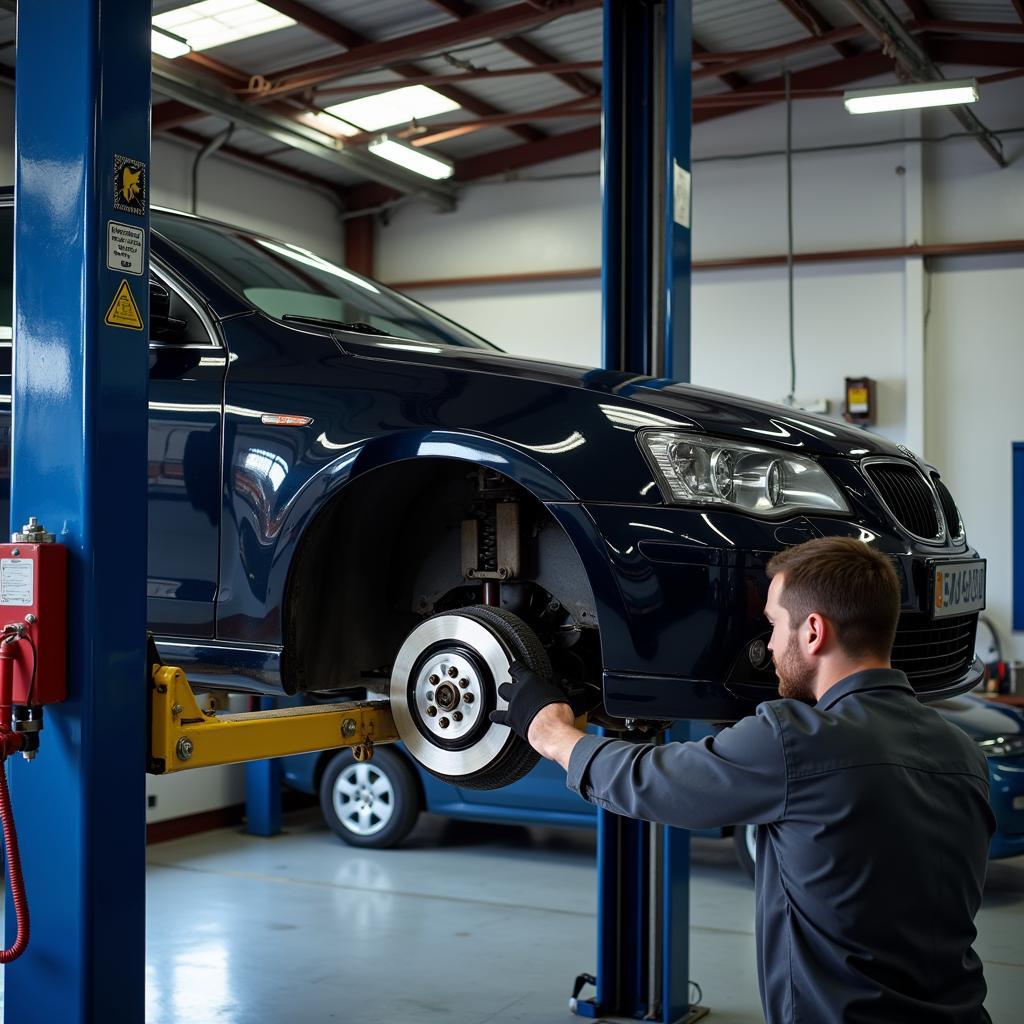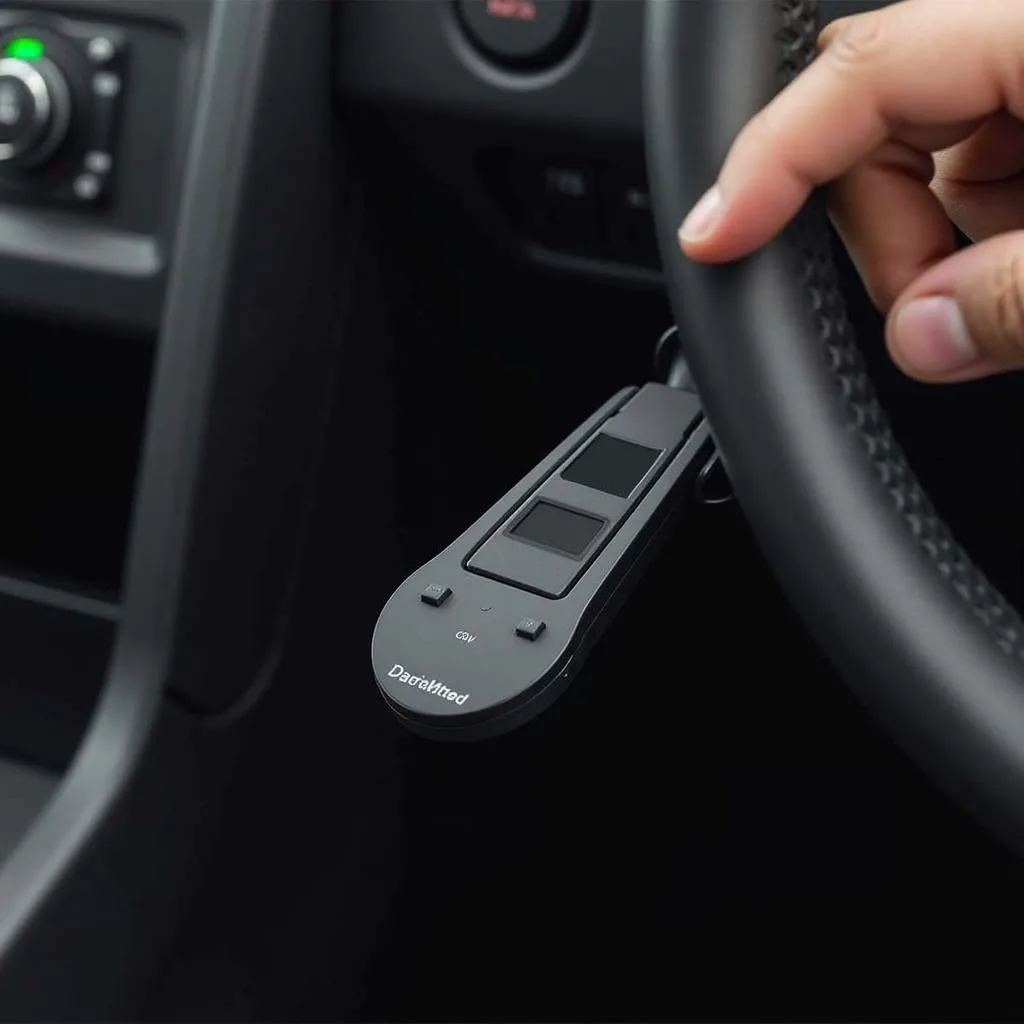A frozen brake caliper, malfunctioning ABS module, or even something as simple as a faulty wheel speed sensor can trigger the dreaded frozen brakes and ABS warning. This comprehensive guide delves into the common causes behind this issue, offers practical solutions, and equips you with the knowledge to address this potentially dangerous situation.
Understanding the Warning Signs
Experiencing frozen brakes and an illuminated ABS warning light simultaneously is a strong indication of a problem within your vehicle’s braking system. Here’s what you might encounter:
- Stiff Brake Pedal: Applying the brakes requires significantly more effort than usual.
- Pulling to One Side: When braking, the car veers to one side.
- Grinding Noise: A grinding or scraping sound emanates from the brakes when applied.
- Burning Smell: A distinct, acrid odor might be present, suggesting brake overheating.
- ABS Warning Light On: The ABS warning light on your dashboard remains illuminated.
Common Causes of Frozen Brakes and ABS Warnings
Pinpointing the exact cause of frozen brakes and an ABS warning requires a systematic approach. Here are the most frequent culprits:
1. Frozen Brake Caliper
The brake caliper houses the brake pads and pistons responsible for clamping down on the brake rotor to slow or stop your vehicle. Over time, the caliper piston can seize due to corrosion or dirt build-up, preventing the brake pads from releasing properly. This constant friction leads to the sensation of frozen brakes.
2. Faulty ABS Module
The Anti-lock Braking System (ABS) module plays a crucial role in preventing wheel lockup during hard braking. A malfunctioning ABS module, often caused by electrical issues or internal component failure, can disrupt the normal brake fluid pressure regulation, leading to a frozen brake sensation and triggering the ABS warning light.
3. Malfunctioning Wheel Speed Sensor
The ABS system relies heavily on wheel speed sensors to monitor the rotational speed of each wheel. When a wheel speed sensor malfunctions or gets coated in dirt or debris, it sends inaccurate data to the ABS module. This misinformation can cause the ABS module to misinterpret a wheel lock-up situation, leading to unexpected brake activation and triggering the warning light.
Remote Diagnosis, Programming, and Software Installation
Advancements in automotive technology have paved the way for remote diagnostics, programming, and software installation as viable solutions for certain brake-related problems.
Here’s how it works:
- Vehicle Diagnostics: Utilizing specialized software and equipment, our team can remotely access your vehicle’s onboard computer to pinpoint the root cause of the frozen brakes and ABS warning.
- Software Updates: In some cases, a simple software update to the ABS module can resolve communication errors or rectify minor glitches that might be causing the issue.
- Remote Programming: With remote programming capabilities, we can reprogram specific modules, like the ABS module, to optimize their performance or calibrate them after a component replacement.
“Remote diagnostics saved me a trip to the mechanic! They were able to identify the faulty ABS sensor and guide me through the replacement process over a video call.” – John S., Satisfied Customer
When to Seek Professional Help
While remote solutions can be effective for certain issues, it’s essential to recognize when professional intervention is necessary.
Consult a qualified mechanic immediately if:
- You suspect a frozen brake caliper.
- You notice brake fluid leaks.
- The ABS warning light persists after attempting troubleshooting steps.
- You’re uncomfortable performing any repairs yourself.
 Car on Lift for Brake Inspection
Car on Lift for Brake Inspection
Conclusion
Encountering frozen brakes and an ABS warning is a serious issue that should never be ignored. By understanding the common causes, recognizing the warning signs, and knowing when to seek professional help, you can ensure your safety and address this problem effectively. Remember, regular brake maintenance is crucial in preventing such situations and ensuring optimal braking performance.
FAQs
Q1: Can I drive with frozen brakes and an ABS warning light?
A: It’s highly unsafe to drive with frozen brakes or an active ABS warning. Doing so compromises your ability to stop safely and increases the risk of accidents.
Q2: How much does it cost to fix a frozen brake caliper?
A: The cost varies depending on the vehicle make and model and whether you opt for caliper repair or replacement. Contact a trusted mechanic for an accurate quote.
Q3: Is it safe to replace a wheel speed sensor myself?
A: If you have mechanical skills, replacing a wheel speed sensor is a manageable DIY task. However, ensure you have the correct part and follow the manufacturer’s instructions carefully.
Q4: How can I prevent brake calipers from seizing in the future?
A: Regular brake inspections, including cleaning and lubricating caliper pins, can help prevent seizing.
Q5: Are remote diagnostics as effective as in-person inspections?
A: While remote diagnostics can effectively identify many issues, certain problems might require a physical inspection by a qualified mechanic for accurate diagnosis.

